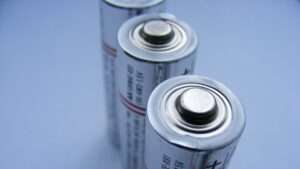In a groundbreaking development, researchers have successfully developed the world’s first non-toxic aluminum-ion batteries (AIB). This technological breakthrough has the potential to revolutionize the field of energy storage, offering a safer and more sustainable alternative to traditional lithium-ion batteries. In this article, we will explore the significance of non-toxic aluminum-ion batteries and their implications for the future of battery technology.

Lithium-ion batteries are the most common type of rechargeable battery used today. However, they have a number of drawbacks, including the fact that they are flammable and contain toxic chemicals.
A team of scientists from Flinders University in Australia and Zhejiang Sci-Tech University in China have developed a new type of battery that is non-toxic and fire-safe. The batteries are made with aluminum ions, which are more abundant and less expensive than lithium ions.
Non-Toxic Aluminum-Ion Batteries: A Game-Changing Innovation
- The Problem with Lithium-Ion Batteries
While lithium-ion batteries have dominated the energy storage landscape, they come with their own set of challenges. Lithium-ion batteries are known for their flammability and the potential for thermal runaway, which can lead to safety hazards. Additionally, the mining and extraction of lithium for these batteries have significant environmental impacts.
- The Promise of Aluminum-Ion Batteries
Non-toxic aluminum-ion batteries offer a promising solution to the limitations of lithium-ion batteries. These batteries utilize aluminum as the electrode material, which is abundant, cost-effective, and environmentally friendly. The use of aluminum eliminates the risks associated with flammability and thermal runaway, making the batteries safer to use and handle.
Key Advantages of Aluminum-Ion Batteries
- Safety: Aluminum-ion batteries are inherently safer than lithium-ion batteries due to their non-flammable nature. This makes them suitable for a wide range of applications, including electric vehicles and portable electronic devices.
- Sustainability: Aluminum is one of the most abundant metals on Earth, and its extraction has a lower environmental impact compared to lithium mining. The use of aluminum in batteries contributes to a more sustainable and eco-friendly energy storage solution.
- Fast Charging: Aluminum-ion batteries have the potential for fast charging capabilities, enabling quick and convenient recharging of devices.
- Longevity: The unique electrode design of aluminum-ion batteries offers improved cycle life, meaning they can withstand a higher number of charge and discharge cycles without significant degradation in performance.
Applications and Future Outlook
The development of non-toxic aluminum-ion batteries opens up exciting possibilities across various industries. These batteries can be utilized in electric vehicles, consumer electronics, renewable energy storage, and even grid-level energy storage. Their enhanced safety, sustainability, and performance characteristics make them an attractive alternative to traditional lithium-ion batteries.
However, it’s important to note that aluminum-ion batteries are still in the early stages of development. Further research and technological advancements are needed to optimize their performance, energy density, and scalability for commercial use. Scientists and engineers around the world are actively working on refining the design and chemistry of aluminum-ion batteries to unlock their full potential.
Here are some of the key benefits of non-toxic aluminum-ion batteries:
- Non-toxic: The batteries do not contain any toxic chemicals, making them safer for the environment and for people who use them.
- Fire-safe: The batteries are not flammable, making them safer to use in portable devices and in other applications where fire safety is a concern.
- High energy density: The batteries can store a lot of energy in a small space, making them ideal for use in portable devices and other applications where space is limited.
- Sustainable: The batteries are made with abundant and inexpensive materials, making them more sustainable than lithium-ion batteries.
Can non-toxic aluminum-ion batteries completely replace lithium-ion batteries?
While non-toxic aluminum-ion batteries offer numerous advantages, they are still in the early stages of development. Further research is needed to optimize their performance and address certain challenges. It is likely that both battery technologies will coexist and be used in different applications based on their specific strengths and requirements.
Are non-toxic aluminum-ion batteries commercially available?
At present, non-toxic aluminum-ion batteries are still in the research and development phase. It may take some time before they are commercially available on a large scale.
What are the challenges in developing aluminum-ion batteries?
Some challenges in developing aluminum-ion batteries include improving energy density, enhancing cycle life, and addressing issues related to electrode degradation and electrolyte compatibility. These areas require further research and development to make aluminum-ion batteries a viable commercial option.
How do non-toxic aluminum-ion batteries contribute to sustainability?
Non-toxic aluminum-ion batteries utilize aluminum, which is abundant and has a lower environmental impact compared to lithium mining. The use of aluminum in batteries reduces dependence on scarce resources and minimizes the ecological footprint of energy storage.
Are there any drawbacks to non-toxic aluminum-ion batteries?
While non-toxic aluminum-ion batteries offer numerous advantages, they currently have lower energy density compared to lithium-ion batteries. Further advancements are needed to improve the energy storage capacity of aluminum-ion batteries.
The development of non-toxic aluminum-ion batteries marks a significant milestone in the field of energy storage. With their inherent safety, sustainability, and performance advantages, these batteries have the potential to reshape the battery industry and pave the way for a more sustainable and efficient energy future. While there are still challenges to overcome, the progress made so far is promising, and ongoing research and development efforts hold the key to unlocking the full potential of non-toxic aluminum-ion batteries. Non-toxic aluminum-ion batteries have the potential to revolutionize the way we store energy. They are safer, more sustainable, and have a higher energy density than lithium-ion batteries. As the technology continues to develop, non-toxic aluminum-ion batteries could become the standard for energy storage in the future.
